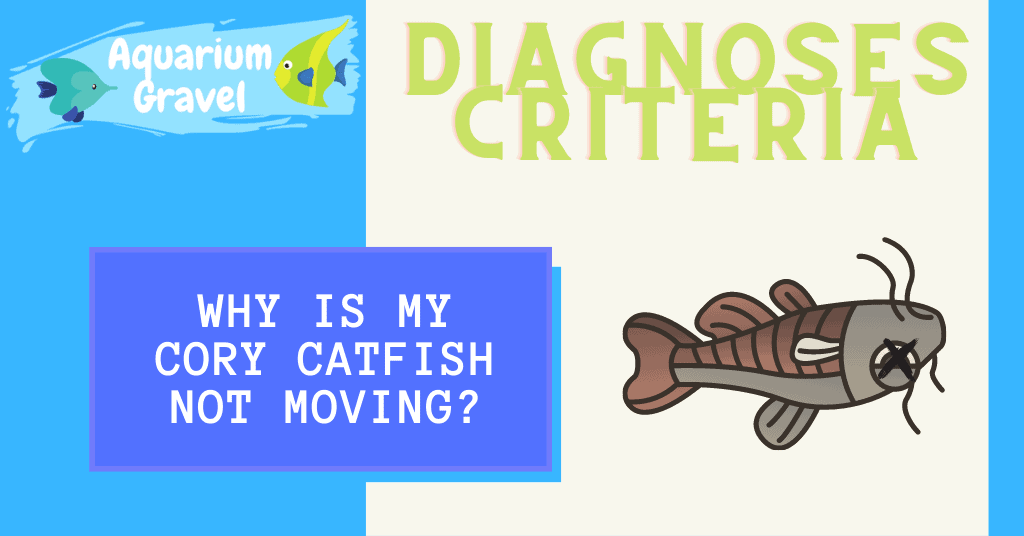Last Updated on August 3, 2023 by cmoarz
Sometimes cory catfish just rest at the bottom of the tank, And sometimes it’s an indication of a larger issue that needs to be diagnosed.
In this article, you will learn
- How to tell if your cory catfish is just resting
- How to diagnose more serious issues
The most common reason a cory will stop moving is just that it is tired.
Sometimes when a cory is being chased by big tank mates, or if they are trying to hide from other fish, they will end up at the bottom of the tank and won’t move much. Usually, after some time they will regain enough energy to get back in the action.
If there are no fish to chase them around, it could be they are simply resting. Corys spend all day scavenging the bottom of your tank as bottom feeders often do, this is a big job and sometimes they need rest.
When things get serious
Table of Contents
If your cory spends an alarming amount of time idle and not eating, that’s when you should start to become concerned. This could mean it is ill or injured. If you can, capture the cory and look at its body for wounds or signs of parasites.
When looking at your cory make sure to check all over its body, they can develop sores from a scrape against rocks or even other fish and these are sometimes hard to see until they get bad enough to manifest.
If you don’t see anything obvious on the cory, or it’s intestines are exposed and appear to have been eaten away, then it may be infected with Columnaris disease. The most common cause for this is from a scrape against gravel or rocks in your tank. It can also be spread by fish that have been in a tank that has a case of columnaris, if not treated it can affect all fish in the tank.
If there are no such signs to be seen, then we can probably safely put that one to the side and explore another possibility;
The water temperature is too low or too high.
Corys are tropical fish. They come from waters with a temperature of about 72 ˚ – 82 ˚ F . (22- 28 ° C)
However, they can withstand cooler temperatures than that and will likely be just fine given the right circumstances. If your cory is used to warmer water conditions, it may just need to acclimate.
The best way to do this is to place them in a tank with water close to the temperature they are used to, (in an area that isn’t exposed to sunlight) and let them adjust over time. Sometimes you can see very small changes in color and mobility of the fish as they become adjusted, so you will want to keep an eye on that.
If your cory has been in a tank with water below 72 ˚ F (22 C ) and is suddenly exposed to higher temperatures than it can handle, then the metabolism of its body will be sped up. Because of this, it may seem like it’s moving around more quickly and you might even see it eating more.
If you suspect the temperature of your tank is causing these issues, let’s try to speed up its recovery by moving it to a tank with water closer to the temperature it needs for about 2 weeks. You should monitor its activity and eating habits during this time, if things improve, move back into the main tank after acclimating him properly.
If your cory has been exposed to temperatures above the 82’s (28 C) then it may not seem to be eating as well and won’t want to move around too much. Their body will be working overtime, trying desperately to cool itself down by expelling excess heat through its gills. By keeping it in a tank with cooler water, (below 82 F) you will give your cory some time to rest and it should recover on its own over time. If it doesn’t seem to be recovering after 2 weeks of being in a cooler tank, then chances are there is something else going on.
If things get really bad…
The most common cause for a cory catfish to not move is a result of it being injured or infected in some way. If the fish does not get any better after two weeks of resting and acclimating, then your other option is to euthanize it and perform a necropsy (a post-mortem on animals) on it. This may sound gruesome, but it’s the only way to know for sure why your cory catfish isn’t harboring anything dangerous for the rest of the tank.
It is possible you may find nothing wrong with the fish and we can breathe a sigh of relief after all, but it is also very possible that you will find internal parasites that have grown inside of its body or signs of bacterial infections that are cause for concern.
At this point, I’m very sorry for your loss. you can always avoid this step and bring him to a vet, But corys are so small and “cheap” your $500 vet bill hardly seems worth it for such an inexpensive fish unless you really do love him.
It is fairly common to lose a small percentage of Corydoras catfish from time to time. They are sensitive little guys that require the right type of care to thrive in our tanks.
About
Owner of AquariumGravel.com and also owner of actual Aquarium Gravel believe it or not! ;). Setting up beautiful aquarium sceneries and habitats since I was very young. Enjoy!
- Web |
- More Posts(290)

